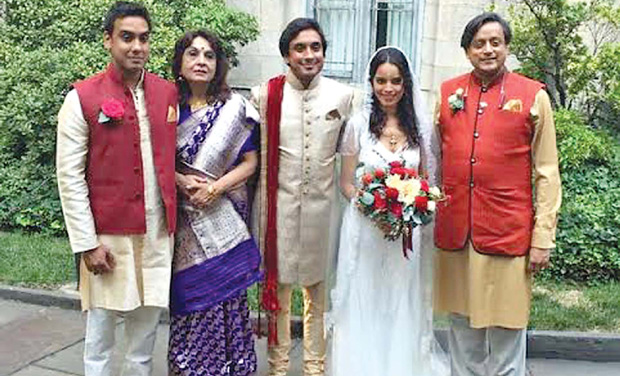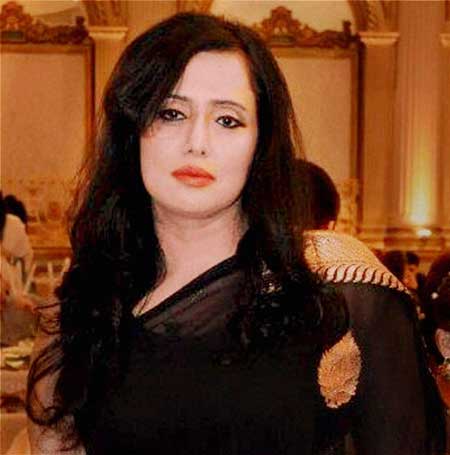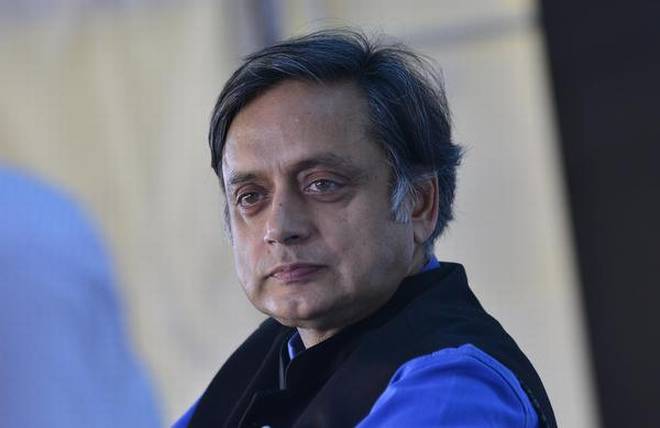He’s high on the list of India’s most successful people and practically became UN secretary general. But Tharoor has also become embroiled in several scandals – including murder.
Shashi Tharoor, the most popular member of India’s parliament, after the prime minister, Narendra Modi, delivers almost the same speech from almost every platform, in describing “his” India.
“India,” the core of the address goes, “is no longer the nationalism of ethnicity or language or religion, because we have every ethnicity known to mankind, practically; we’ve every religion known to mankind We have 23 official languages that are recognized in our constitution … We don’t even have geography uniting us, because the natural geography of the subcontinent framed by the mountains and the sea was hacked by the partition with Pakistan in 1947. Even the name ‘India’ comes from a river, the Indus, which flows in Pakistan.
“But the whole point,” he continues (these words come from a TEDIndia talk from a few years back), “is that India is the nationalism of an idea. It’s the idea of an ever-ever-land, emerging from an ancient civilization, united by a shared history, but sustained, above all, by pluralist democracy. That is a 21st-century story, as well as an ancient one.
“And it’s the nationalism of an idea that essentially says you can endure differences of caste, creed, color, culture, cuisine, custom and costume … and still rally around a consensus. And the consensus is of a very simple principle, that in a diverse plural democracy like India, you don’t really have to agree on everything all the time, so long as you agree on the ground rules of how you will disagree.”
Tharoor reiterated these ideas at the annual 10-day Asian Forum on Global Governance in New Delhi late last year. On the final day of the event, where he served as the professional dean and was in charge of the content and leading all the panels, I interviewed him for Haaretz. Tharoor’s charisma abounds equally whether he’s speaking to a packed hall or taking part in an intimate conversation, and his broad knowledge flows freely. He’s always dressed very elegantly in traditional Indian clothes and smiles often.
Tharoor, 58, a member of the Indian National Congress Party, is high up on every list of India’s best and brightest. He’s written 14 best-selling books in English, including a collection of short stories and three novels, notably “The Great Indian Novel” (1989). He’s also published a biography of India’s first prime minister, Jawaharlal Nehru, seven nonfiction works, plus two books of photographs, about his country. Until he entered politics in 2009, he wrote a weekly column, “India Reawakening,” that was syndicated in 80 newspapers worldwide.
But in today’s spirit one can say Tharoor’s main claim to fame is the number of followers he has on Twitter. No fewer than 2.69 million people imbibe his cogitations avidly, more than any other rank-and-file politician in the world. By comparison, U.S. Secretary of State John Kerry has 366,000 Twitter followers.
“India is a place where opinions are very easily divided. So when one is active on social media such as Twitter, there are as many people who hate me as the number of people who love me. It makes me a source of attention in one way or another, which as a politician, is something you might want. I had a Twitter account, and this hadn’t been done by any other politician before, so there was a great deal of shock, horror and consternation at my craziness. In fact, I actually had to educate people about the importance of social media.”
He apparently succeeded, because according to some observers, social media were instrumental in the victory of the current prime minister, Modi, in last May’s election. Modi is known to have made his Twitter visibility a key mission of his campaign, and rumor has it that Tharoor was both his motivation and his target: Modi, it is said, aimed to surpass him in number of followers. (He succeeded, now having 9.41 million.)
“India is so vast that one can say a certain thing about it and the exact opposite, and both will be correct. This is the case with the status of women in India. On one hand, we were the first nation to allow women to study medicine; in all our history we have been blessed with great, powerful female politicians and leaders, and many women in top ranks.
“On the other hand, the status of women in many rural places is appalling, and in distant villages there is a parallel law system that does not abide with the main one, and does not help women as the law is supposed to. In the past two years, there has been a slight improvement, but we still have a very long way to go.”
After the appalling gang rape in New Delhi in 2013, you spoke about the need for new legislation. What was the idea behind that?
“I was wondering what interest is served by continuing to preserve the anonymity of the victim, as if she is the one who should hold shame. Why not name and honor her as a real person with her own identity? She should become the symbol of change in India. But it didn’t pass, there were too many opponents to this idea.”
Advocate of transparency
Shashi Tharoor was born in London to an Indian family; he has two sisters. His father, originally from Kerala, a state in southwest India, was the group advertising manager for the Indian newspaper The Statesman. When Shashi was two, the family returned to India. He attended various schools in Mumbai, Calcutta and finally university in Delhi, obtaining an undergraduate degree in art and history. At age 19, he went to the United States to obtain an M.A. in international relations, at Tufts University.
Tharoor has twin grown sons from his first wife; they were born in the United States and still live there, and both of them are engaging in writing and journalism. Tharoor’s second wife, from whom he is also divorced, is a Canadian diplomat. His third wife, the late Sunanda Pushkar, was a wealthy Indian businesswoman and philanthropist. More about her later.
Politically, Tharoor is a salient member of the left-liberal camp. He believes in economic competition and government-encouraged small businesses, and believes that India’s future depends on its ability to open up to the world. He is keen on freedom of the press and an avid advocate of governmental transparency. He was the first elected representative in the history of India to publish annual reports about his work and his expenses, and urged other politicians to do likewise.
Tharoor spent 30 years with the United Nations, beginning in the UN High Commissioner for Refugees (UNHCR) in Geneva, and working his way up in the organization. In 2001, he was appointed under-secretary general for communications and public Information, where he learned much about image presentation and about using various means to get messages across – skills that would boost his popularity later.
In 2006, he was nominated by the Indian government for the post of UN secretary general, becoming the first Indian to compete for the position. He and Ban Ki-moon, from South Korea, led all the other candidates. In the end, Tharoor received two fewer votes than Ban. Tharoor congratulated him, declined his offer to serve as his deputy, and left the UN.
At the age of 52, two years after that defeat and 33 years after leaving India, Tharoor returned to his country, famous and popular.
“I feel as if I have never left India,” he says, adding, “I’m an Indian who happens to live in New York or work in Switzerland. Geography for me is a circumstance, not an identity.”
Political parties courted him. He decided to join the ruling Indian National Congress party as a representative of Kerala. Despite being characterized as an elitist and criticized for living abroad most of his life, Tharoor won the election and also served as minister of state for external affairs (in India, in addition to the chief foreign minister, deputies are elected from the different states) under the government of Prime Minister Manmohan Singh.
Glut of enemies
However, a first scandal of many that would punctuate Tharoor’s political career led him to resign as minister of state only 10 months after taking office. He was accused of having abused his position to obtain shares in the Indian Premier League cricket franchise for Sunanda Pushkar (later his third wife). Tharoor denied the charges, and in his resignation speech in Parliament called for a full inquiry, promising to cooperate. He alleged that he had been incriminated by “some powerful political cricket interests.” Shortly afterward, he married Pushkar in his ancestral home in Kerala. The investigation, conducted while he was in Parliament found no wrongdoing, and two years later, in 2012, Tharoor was appointed minister of state for human resources development.
Your short political career has been hampered by scandals.
“I came into Indian politics in very unusual circumstances. Simply no one has ever been abroad most of his life, coming back seeking to win elections. I came back and was crazy enough to participate in the election and win it. I made an immediate amount of fans, because it was unusual, and an immediate amount of enemies, who resented what they saw as my parachuting myself into their profession, intruding on their space.
“In India, most of the politicians are fulltime, lifelong politicians, who gradually climbed the ladder since their student days. It’s all they ever did in their professional lifespan. So a person like me, who had ‘another’ life, arrives, and of course that’s not easy for everyone to accept. Furthermore, I lived a long time in other democracies, and I had a strong conviction that transparency is the right way to go and I spoke freely to the media about that.”
Another, recent controversy involving Tharoor cost him the position of being his party’s official spokesman. In October, the prime minister launched the biggest cleanup campaign in India’s history: The operation encompassed thousands of locales, and three million civil servants and university and high-school students pledged to help clean the country’s roads, highways and public spaces. An additional aim was to build proper toilets for the more than 50 percent of the population who had no access to them.
Modi himself kicked off the campaign by sweeping a street. He called on nine Indian celebs, including Tharoor, to take part in the campaign, and asked each to invite another nine, and so on, pyramid-style. Tharoor acceded and praised Modi for the initiative, but for cooperating with the Congress party’s bitterest opponent, he was dismissed as its spokesman.
Tharoor acknowledges that, under the circumstances, it was “awkward” for him to remain in that post: “You cannot speak for a party and do something that most of the party doesn’t agree with. It was a reciprocal separation: I felt relieved not to be an official spokesman.”
 Shashi Tharoor’s son gets married
Shashi Tharoor’s son gets married
Murder or suicide?
But the most tragic episode of his life – whose plot recalls a Bollywood movie – involves his third wife. A year ago, a series of intimate tweets appeared on Tharoor’s Twitter account, for his eyes only, from a Pakistani woman, the journalist Mehr Tarar. Tharoor immediately tweeted that his account had been hacked and that he was dealing with the breach.
In fact, it was ultimately Pushkar, Tharoor’s wife, who went into the Twitter account and made the tweets public. She told the Mumbai-based Economic Times, “Our accounts have not been hacked … I cannot tolerate this. This is a Pakistani woman who is an ISI [Inter Services Intelligence] agent, and she is stalking my husband. And you know how men are. He is flattered by the attention. I took upon myself the crimes of this man during IPL [that is, she was blamed for wanting shares in the Indian Premier League] I will not allow this to be done to me. I just can’t tolerate this.”
Pushkar told the Indian Express newspaper that Tharoor had been having a “rip-roaring affair” with Tarar, and that she would “seek divorce.”

Shashi Tharoor accused of having affair with Pakistani journalist Mehr Tarar by Sunanda Pushkar.
Tarar, for her part, denied that she was in any kind of relationship with Tharoor. A friend of hers told the media that Tarar strongly denies any affair with Tharoor or the claim that she was spy. She said she had had a brief, platonic friendship with him – mainly via email – after she met and interviewed him for her newspaperm and that the controversy and death had been caused by unfounded paranoia. Tharoor had loved his wife like “a romantic saga hero,” she said. “Nothing meant more to him than making her happy.”
The next day, January 16, 2014, Tharoor and Pushkar issued a joint statement: “We wish to stress that we are happily married and intend to remain that way. Sunanda has been ill and hospitalized this week and is seeking to rest.”
A day later, Tharoor found his wife dead in their suite in a luxury hotel, where they had been staying while their house was being painted. Tharoor’s personal secretary said that Pushkar had been found dressed, lying on the bed, and that there were no signs of violence. However, the next day one of the pathologists who conducted an autopsy said that marks of violence had been found on the body. Tharoor insisted that his wife had died of natural causes.
Three weeks ago, BBC India quoted the local police as saying that her death was “not natural and was due to poisoning.” Additionally, according to media reports, 15 injury marks were found on Pushkar’s body. Tharoor was questioned by police for several hours the following week; he was “cooperative,” the Delhi police commissioner stated.
Before that Tharoor had tweeted, “I am stunned to hear Delhi police have filed a case of murder against unknown persons in the demise of my late wife. I am anxious to see the case is investigated thoroughly.”
But it’s not clear whether the truth will ever come to light in this affair, which continues to get big play in the Indian media and elsewhere. According to unconfirmed press reports, two empty packets of Alprax tablets – a drug, marketed as Xanax elsewhere, used to treat anxiety or panic attacks – were found next to the hotel bed, but no traces of the drug were found in Pushkar’s blood in the autopsy. Possibly, then, someone left them there to fake a suicide scene.
On January 13, the Times of India quoted a statement made by the senior Indian journalist Nalini Singh: “Over the last year or so, Sunanda had started talking to me about her private life and particularly about her relationship with Shashi. Almost six-seven months ago, Sunanda had shared her pain over what she regarded as mutual romantic interest between Shashi Tharoor and a Pakistani journalist named Mehr Tarar. She told me that she was sure Tharoor and Tarar had spent three days together in Dubai in June 2013.”
Digital romance
Tharoor’s political rivals pounced on the personal tragedy. On January 6, The New York Times quoted Subramanian Swamy, from the ruling Bharatiya Janata Party, as saying that Pushkar’s death was a “well-planned murder” (though he did not explicitly connect Tharoor with the crime).
A precondition for my conversation with Tharoor, per the request of the head of the Asian Forum and not from Tharoor himself, was that we not discuss the case.
Tharoor himself looks relaxed in every situation. No sign of embarrassment or shame was discernible. At the end of our talk, he clasped my hands warmly, and said, “I enjoyed it very much.” The thought that this affable person might have murdered his wife in cold blood haunted me all the way home.
Tharoor and the Jews
“It has always been a matter of pride for me that one of the very few countries in which the Jewish people never suffered any persecution was India,” Tharoor writes at the beginning of his brief chapter about India’s Jews in his 2007 book “The Elephant, the Tiger, and the Cell Phone: India, the Emerging 21st Century Power.”
One of the reasons for his special interest in the community is that the first Jews in India lived in the region of Kerala, his beloved childhood home, and especially in Kochi (also known as Cochi); hence, they are known as the Cochini Jews. In line with the most commonly accepted hypothesis, he puts that date at 597 B.C.E. following the capture of Jerusalem, and the subsequent destruction of the First Temple by the Babylonians under Nebuchadnezzar.
“The Jews of Kerala practiced their faith and customs unhindered, and established themselves in Kochi, where they built an exquisite synagogue that still stands” as Tharoor says and writes in his book.
In our talk, he went into detail about the history of India’s Jews, noting that the next large wave arrived in the country after the destruction of the Second Temple by the Romans. However, the largest group of Jews who immigrated to India were the Bene Israel, though the date of their arrival is not known.
“They were treated as a separate caste,” he explains, “until one day, in the 11th century [according to some historians it was in the 18th or 19th centuries], an Indian rabbi called David Rahabi met the Bene Israel and was astounded to see that their customs were thoroughly Jewish. Only then did it become clear, both to them and their fellow Indians, that they were not a caste per se, but Jews.”
More recently, Jews arrived in India during the era of the British Mandate. Known as the “Baghdadi Jews,” Tharoor explains, they were primarily educated, urban professionals from Damascus, Alexandria and Baghdad, who were seeking the security afforded by the British Empire; they integrated well and were successful.
Tharoor adds that his first publisher belonged to that group, as was a former legal adviser to the Ministry of Home Affairs, “and also one of our national heroes.” (He’s referring to Lt. Gen. Jacob-Farj-Rafael Jacob, who played a key role in India’s victory in the 1971 Indo-Pakistan War.)
Tharoor visited Israel in 2012 and, according to him, met amazing people – “great and creative minds with initiative, force and a sense of entrepreneurship.” He adds that he had a few Israeli friends at the UN, and also many Jewish friends.
“We have marvelous relations, but there is one matter on which are divided: the Palestinian issue. We believe officially that the Palestinians deserve a state exactly as the Israelis do. There is actually a Palestinian legation, which functions as an embassy, in New Delhi. We think that Israel should evacuate settlements, and assist in the establishment of a Palestinian state. Despite our views, which we voice openly, we are managing to preserve good relations with Israel. That is a certificate of merit both for Israel and for India.”




















































